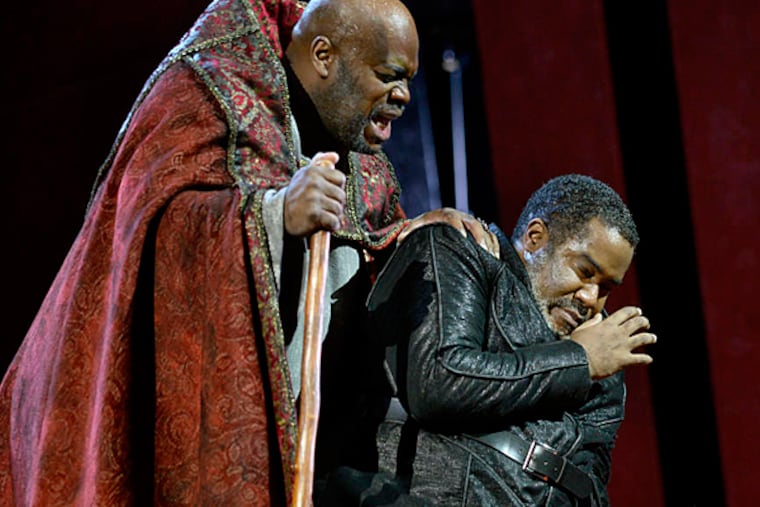Review: An underdone 'Don Carlo'
No crosses. No thrones. Some red lights when the heretics are burned at the stake. At what point does a less-is-more dramatization of the Spanish Inquisition turn into less-is-less?

No crosses. No thrones. Some red lights when the heretics are burned at the stake. At what point does a less-is-more dramatization of the Spanish Inquisition turn into less-is-less?
Though Opera Philadelphia's production of Verdi's Don Carlo assembled many promising personalities, among both singers and the creative team, Friday's opening at the Academy of Music felt half-formed, more like a medium-voltage dress rehearsal than a performance.
The one tangible problem was mezzo-soprano Michelle DeYoung in the pivotal role of Princess Eboli, who was clearly out of vocal sorts in her first big aria, "O Don Fatale" and, by the Sunday performance, was officially ill. Conductor Corrado Rovaris attentively coaxed her and the other singers, but sometimes at the expense of orchestral momentum.
No single production of Don Carlo - a tale of freedom fighters in Spain and a queen who is promised to the prince but forced to marry his father - can be expected to meet all challenges. Objectively speaking, this one was more than respectable (an achievement in itself) but how much more depends on the potential realized in future performances.
On Friday, the only singer who truly commanded his role was Morris Robinson as the Grand Inquisitor. This secondary role is often played as a feeble but terrifying lion in the winter; here, he was a man at the height of many powers whose blindness paradoxically allows him to penetrate everyone's political artifice and work their weak spots.
That kind of performance is particularly what's needed in Tim Albery's spare production, whose earth-colored fortress walls and central dome suggested the might behind the 16th-century Spanish royalty; in the second half, a partly cloudy sky could have signified the twilight of the gods or the beginning of a new era. But Andrew Lieberman's stage design became less interesting the longer you peered at it, mainly for lack of secondhand eloquence that comes when a set is framing full-tilt performances.
As for the singers, in the title role tenor Dmitri Pittas offered tentative low notes mixed in with suitably bright, gleaming ones. He was almost at full strength by the end of the opera but still didn't seem to quite know whom he was playing. As the tortured King Philip, bass-baritone Eric Owens definitely knew what he was about, and fearlessly projected loneliness beyond words in his great monologue, but elsewhere seemed not to have the role fully worked into his voice.
As the anguished queen Elisabeth, soprano Leah Crocetto wasn't so convincing theatrically but displayed a wonderfully lush, Verdian voice that sustained the final act right when it was needed. Not so Verdian was middleweight baritone Troy Cook (Rodrigo), though in his important moments his superb sense of legato was put at the service of a deeply felt, beautifully articulated characterization that became the soul of the opera.
OPERA REVIEW
Don Carlo
April 29, May 1, and 3 at the Academy of Music, Broad and Locust Streets
Tickets: $19-$239 Information: 215-893-1999 or www.operaphila.org
EndText